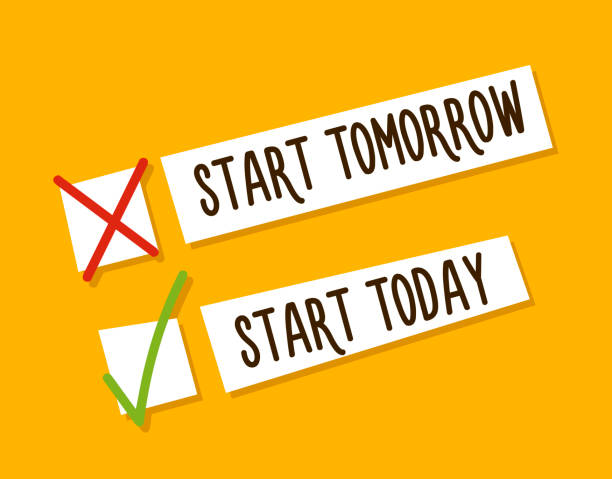How to Stop Procrastinating and Taking Pragmatic Actions

Procrastination is a common struggle that many people face. It can be tempting to put off tasks and responsibilities, hoping that somehow they will magically get done on their own. However, the truth is that procrastination steals our productive time, leaving us feeling overwhelmed and unaccomplished. The only way to stop procrastinating is to take pragmatic and deliberate actions against it.
Taking actions to overcome procrastination is essential if we want to make the most of our time and reach our goals. It requires a shift in mindset and a commitment to change our habits. While it may be challenging at first, incorporating small and regular actions into our daily routine can help us conquer procrastination.
One effective strategy to combat procrastination is to break tasks down into smaller, more manageable chunks. We can use visual planners for procrastination relief. When facing a large project or daunting task, it is easy to feel overwhelmed and put it off. However, by breaking it down into smaller steps, we create a clear plan of action that makes it easier to get started.
Another useful technique is to create a schedule or to-do list. By laying out specific tasks and assigning them time slots, we establish a structure that helps us stay focused and disciplined. This simple practice not only prevents us from becoming overwhelmed but also ensures that we are dedicating adequate time to each task.
Setting realistic goals can also be instrumental in overcoming procrastination. Often, we procrastinate because we have set unrealistic expectations for ourselves, leading to feelings of failure and discouragement. By setting achievable goals, we increase our motivation and reduce the likelihood of putting off tasks. It is advisable to utilize some best productivity tools for chronic procrastinators.
Implementing accountability measures can be a powerful tool in our battle against procrastination. Whether it is sharing our goals with a friend or joining a supportive community, having others hold us accountable can provide the encouragement and support we need to stay on track. If you are wondering how to stop procrastinating when you're overwhelmed, try peer accountability!
It is important to recognize that overcoming procrastination is not an overnight process. It requires patience, consistency, and self-compassion. It is okay to have setbacks or fail to meet our expectations at times. The key is to learn from these experiences and keep pushing forward.
Have this as one of your procrastination recovery plan: Cultivating a positive mindset is vital when working to eliminate procrastination from our lives. Instead of focusing on past failures or the magnitude of the tasks ahead, we should celebrate our progress and focus on the steps we have taken. Embracing a growth mindset allows us to view challenges as opportunities for growth rather than obstacles to our success. This is one of the well-known psychological strategies to beat procrastination and anxiety.
One effective strategy for maintaining motivation and focus is to reward ourselves for completing tasks. By setting up small rewards for each accomplishment, we create a sense of satisfaction and reinforcement that reinforces our commitment to overcome procrastination.
Another important aspect of stopping procrastination is managing distractions. In our modern world, numerous distractions, such as social media and email notifications, can easily sidetrack us from our tasks. Minimizing these distractions, such as turning off notifications or setting designated times for checking emails and social media, can significantly improve our productivity.
Developing effective time management skills is crucial for overcoming procrastination. By prioritizing tasks based on importance and urgency, we ensure that we are devoting our time and energy to the most critical activities. Time-blocking, a technique where we assign specific time slots for different tasks, can be particularly effective in maximizing productivity.
Building a routine that includes regular breaks and self-care is essential for combating procrastination. Taking short breaks throughout the day can help refresh our minds and prevent burnout. Engaging in activities that recharge us, such as exercise, hobbies, or spending time with loved ones, equips us with the energy and focus necessary to tackle our tasks.
Developing a sense of purpose and understanding our "why" behind our goals can provide us with the motivation to overcome procrastination. When we have a clear understanding of why a task or goal is important to us, we are more likely to take action and stay committed, even when faced with challenges.
Overcoming procrastination requires self-reflection and the willingness to identify the underlying causes of our procrastination habits. It may be helpful to explore any fears, perfectionism, or self-doubt that may be contributing to our tendency to put tasks off. By addressing these root causes, we can develop strategies to overcome them and move forward.
Surrounding ourselves with a positive and supportive environment can make a significant difference in our ability to overcome procrastination. Connecting with like-minded individuals or seeking out mentorship and guidance can provide valuable encouragement and accountability.
Incorporating mindfulness practices into our daily routine can help combat procrastination. Mindfulness allows us to be present in the moment and develop a greater awareness of our thoughts and actions. By practicing mindfulness, we can identify when we are tempted to procrastinate and redirect our focus towards taking action. Experiment with different mindful techniques for procrastination and select the most useful ones for you.
Staying organized is essential when combating procrastination. By keeping our physical and digital spaces tidy and organized, we create an environment that is conducive to productivity. Additionally, maintaining a clear and organized system for managing tasks and deadlines ensures that nothing slips through the cracks. Get yourself some journaling prompts to fight procrastination and organize your life.
Developing healthy habits, such as getting enough sleep, eating nutritious meals, and exercising regularly, provides us with the physical and mental energy necessary to combat procrastination. Taking care of our well-being ensures that we have the resilience and endurance to overcome challenges and stay focused on our goals. This is how to build habits that eliminate procrastination long-term from everything you do!
Finally, embracing the idea that we can overcome procrastination by taking regular, deliberate actions, no matter how small they are, is key to our success. Each small step forward builds momentum and strengthens our commitment to change. By consistently taking action, we can gradually break free from the cycle of procrastination and achieve our ambitions. Consider all the pieces of information in this article as your procrastination coaching tips.
Check This Out!
|
| |
|
| |
|
|











